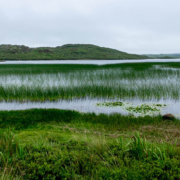The Need to Address Both Climate Change and Poverty
Climate change and poverty are intimately connected. This connection deserves a closer look, given deepening social and economic inequalities worldwide. The call to integrate climate adaptation measures with poverty reduction measures are ongoing.
In 2021, countries facing the greatest ecological threat were the same as those facing the greatest need for economic support. A longstanding recommendation of the OECD is to increase the adaptive capacity of nations to combat climate change and to address poverty.
A report by The Green Resilience Project highlights four recommendations for Canadian government and climate policymakers to enhance economic vitality of communities while addressing climate change. These recommendations are to:
- Incorporate basic income into Canada’s plan for a just transition.
- Design income security and climate policy solutions to focus on improving individual and collective quality of life.
- Empower people and communities with the tools and resources they need to build or strengthen resilience
- Ensure that corporations and the wealthy pay their fair share.
It is time to rethink the term “resilience,” if not to do away with the word altogether, so that governments, corporations, and society can more realistically address the emergent and long-term needs of nations and communities to address poverty and climate change effects simultaneously. Investment into sustainable projects that address the dual problems of climate change and poverty can counter the overemphasis on how nations and communities fight environmental and economic adversity despite all the odds.
By Leela Viswanathan
(Image credit: Aaron Burden, Unsplash)





 Radoslav Bali, Unsplash
Radoslav Bali, Unsplash Markus Spiske, Unsplash
Markus Spiske, Unsplash


